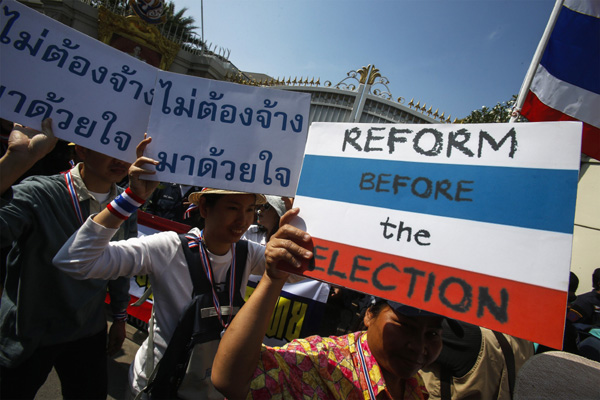

|
 |
|
Anti-government protesters carry placards during a mass rally outside the house of Prime Minister Yingluck Shinawatra in Bangkok December 22, 2013. [Photo/Agencies] |
BANGKOK - Thai Prime Minister Yingluck Shinawatra unveiled a plan on Wednesday to create an independent reform council to try to appease opponents who, angered by her billionaire family's political dominance, are calling for her resignation.
The proposal, which comes after weeks of anti-government protests that have rallied more than 200,000 people at their peak, could be put into play soon and would be free of government interference, Yingluck said in a televised address.
Yingluck is caretaker premier after calling a snap election for Feb 2 in a bid to deflate the protests. Her compromise offer was immediately rejected by the protesters, who draw strength from Bangkok's middle class and elite and who dismiss her as a puppet of her self-exiled brother, Thaksin Shinawatra.
Thaksin and Yingluck have their power bases among the vote-rich north and northeast but their opponents accuse former premier Thaksin of manipulating the rural poor in those areas to entrench his power.
Yingluck's plan calls for a council of 499 eminent Thais, chosen by a wider group of 2,000, to examine reform of Thailand's political system.
It looks similar to the unelected "people's council" protest leader Suthep Thaugsuban has proposed to replace the government, with one crucial difference. Under Yingluck's proposal, the reform council would operate alongside an elected government, not an appointed one.
"This council is not the government agency ... it would let it run on its own and would not be overshadowed or influenced by the government," Yingluck said.
"I insist that the new elected government will take this and implement what the council decides on how to reform the nation."
Demonstrators still want to derail the election because they know Thaksin's populist political juggernaut is almost certain to win the vote, as it has at every ballot since 2001.
This is despite violent street protests, judicial and military intervention around other elections since then.
PROTESTERS DISMISS PLAN
Tavorn Seniem, a protest leader, dismissed Yingluck's proposal and said Thaksin would try to stuff the 499-member council with his own people.
"This council would work for the benefit of the government's side, not for all Thai people," he told Reuters.
Thaksin, a telecoms billionaire, was overthrown in a 2006 coup. He has lived in self-exile since 2008, when he was sentenced to a two-year jail term for graft, a conviction he calls politically motivated.
Opponents say Yingluck is merely a puppet, with Thaksin pulling the strings from his mansion in Dubai.
What has vexed many urban Thais is Thaksin's popularity among rural voters in the north and northeast, who remain loyal to him due to policies like cheap healthcare, easy credit and price guarantees for farmers.
Yingluck has been out meeting those supporters over the past week and plans to stay in the north until the New Year.
She has refused to postpone the poll, which appears uncertain after the main opposition Democrat Party declared it would boycott the vote. The Democrats have powerful backing from a Bangkok establishment of generals, bureaucrats and influential conservatives with deep disdain for Thaksin.
Thaksin's opponents tolerated Yingluck's government over its first two years but that quickly changed when her Puea Thai Party tried to push an amnesty bill through parliament in November that would have allowed him to return a free man.
The mainly peaceful anti-government protests since then have been large in number but have failed to stop the government functioning, causing concerns that other protagonists might try to create violence in the hope the military might intervene.